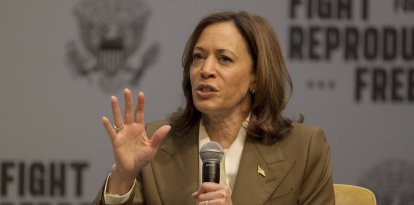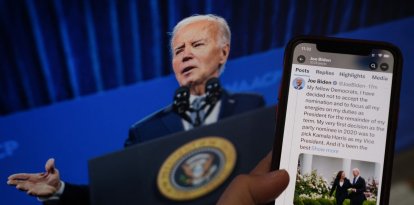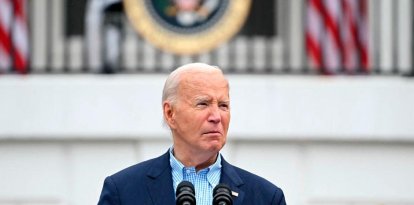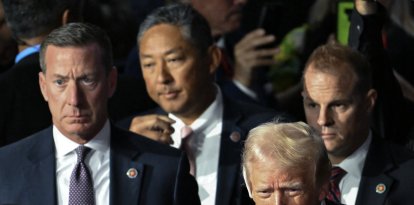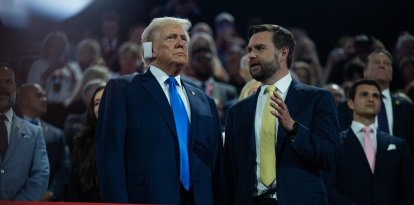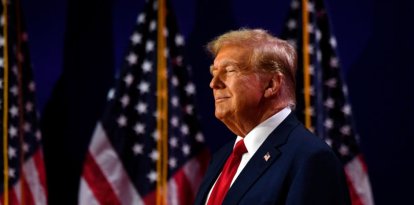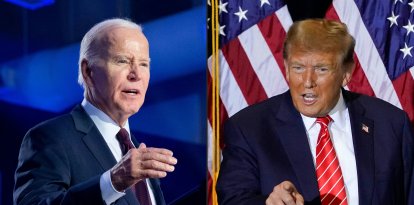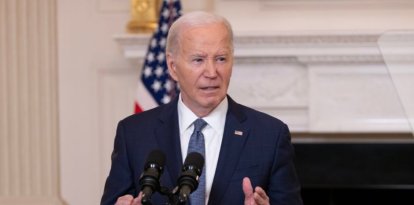The five fatal flaws of Ron DeSantis' campaign
The governor's withdrawal before the New Hampshire primary marked the end of a campaign filled with negative headlines, rookie mistakes and structural issues deep within his team.
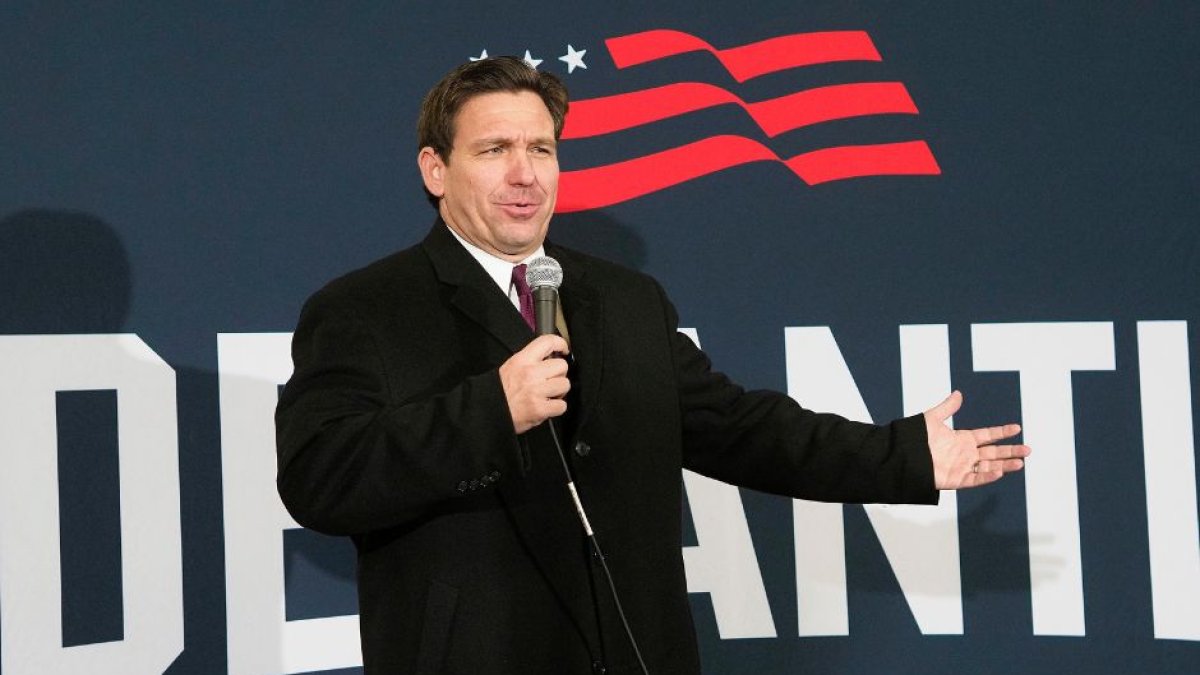
Imagen del gobernador Ron DeSantis en plena campaña presidencial. (Cordon Press)
Nothing that starts so badly can end well. Florida Governor Ron DeSantis already had a major challenge ahead of him in standing up to a political colossus like Donald Trump. His campaign ended up as an accumulation of unforced errors that took him out of of the fight too quickly.
In tennis terms, it is similar to when a top player on the ATP circuit faces Novak Djokovic. The chances are there, perhaps he has the potential to emerge victorious, but he must make as few mistakes as possible. Unfortunately for his aspirations, DeSantis' campaign reaped the opposite of a competitive match. Below are the fatal errors that led to the suspension of his campaign.
Not taking advantage of midterms 'momentum'
Although it seems like an eternity ago, the midterm elections were held in November 2022, that is, just 14 months ago.
The expectation was for a red wave, considering Biden's disastrous management and the dysfunction within the Democratic Party. However, the Republican Party missed a historic opportunity to dominate both House and Senate, the Democrats survived, Donald Trump's candidates in swing states were not up to par in the Senate, and only one person emerged stronger in the GOP: Ron DeSantis.
The governor was not only re-elected, but he crushed all of his Democratic opponents and turned Florida from purple to red. It gave his formula proof of concept if Republicans wanted to make good efforts and win elections. DeSantis, nicknamed “DeFuture” at that time, had a powerful political “momentum” under his arm that, inexplicably, he allowed to wither away.
State and national polls put him on par with a weakened Trump. But the governor, instead of taking advantage, backed down and took months to definitively announce his campaign. In the interim, the former president gained strength. The politically motivated accusations, instead of burying him, actually elevated him, and all that energy was channeled not against the Democrats, but against Trump's main threat: DeSantis.
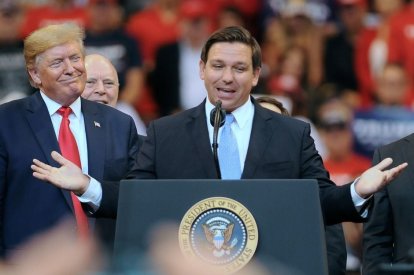
Donald Trump Ron DeSantis
Trump spent months attacking DeSantis, something not seen since the 2016 campaign, when the then 'outsider' crushed the Republican establishment. Meanwhile, the governor of Florida did not get into the mud, he allowed himself to be beaten and allowed the favorite grow stronger. It was an unforgivable mistake that writer and political commentator Ryan Girdusky mentioned to DeSantis in a private meeting with conservative influencers.
“The first time you ignore it, you seem honorable; the fiftieth time, you look like a pussy.”
A Twitter Space? Oh really?
DeSantis not only missed his big chance after the midterms, he also missed the enormous opportunity to vault himself back into the conversation with a strong campaign announcement.
How different would the race for the Republican nomination have been if DeSantis opted for a massive rally in Florida instead of a flawed Twitter Space overshadowed by the figure of Elon Musk? It is difficult to know, but several experienced political strategists agree that it was the worst electoral announcement in the modern history of the United States.
DeSantis and Musk's Space garnered negative headlines for its technical failures and, in addition, the governor lost the brilliant opportunity to be photographed, have video clips and generate electoral merchandise that would have allowed him to earn funds.
From that moment, according to an NBC News report published before DeSantis' official withdrawal, many doubts began to arise about his candidacy from his inner circle.
“When they decided to do the Twitter Spaces launch, maybe then at that point, I knew they were stupid,” said an anonymous former adviser to Never Back Down, the troubled Super PAC that supported DeSantis.
Girdusky said something similar, regarding the “innovative” idea of a Twitter Space: “This is the stupidest f***ing idea I’ve ever heard.”
Not talking to the media was a bad idea
DeSantis himself acknowledged it.
“I came in not really doing as much media,” the governor told conservative radio host Hugh Hewitt. “I should have just been blanketing. I should have gone on all the corporate shows. I should have gone on everything.”
As much as DeSantis became popular nationally, largely due to his voracious attacks on the mainstream media, neglecting the corporate media in a presidential campaign is still like going to a hunting competition without a rifle. DeSantis gave up a platform where he could shine, talk about the topics of conversation that matter, reach the independent electorate and, basically, get free publicity.
It is absolutely factual that a provocative, sagacious and inspiring DeSantis on CNN, MSBNC, ABC or any other progressive network was going to be much more beneficial for his campaign than a DeSantis in the shadows.
Never Back Down: The final blow to DeSantis
A well-organized super PAC that respects its boundaries can be a huge boost to get a candidate over the finish line, while a problematic and overly intrusive one can simply derail all of the candidate's efforts. Never Back Down was much closer to the latter than the former.
“DeSantis’ campaign hired dozens of staffers in the earliest stages of the race, sapping the operation of much-needed early cash. Within the first two months, 40% of initial hires were fired to conserve resources,” NBC News reported. “A cash-strapped campaign elevated the role of Never Back Down, which promised to spend $200 million boosting his bid but ended up mired in infighting that often spun off negative headlines overshadowing the campaign itself.”
For example, a key moment of the campaign was when DeSantis completed his tour of the 99 counties of Iowa, the state where he practically put all his political and economic efforts to compete in the primaries. A situation like this should only serve for glowing headlines. However, at that time, the media had something more attractive to cover: the umpteenth internal crisis at Never Back Down, which had named its third CEO in just two weeks.
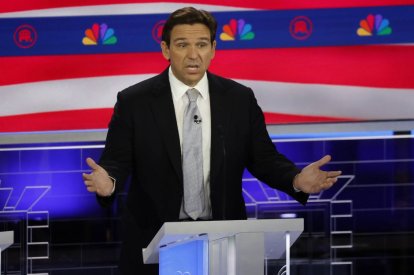
GOP nomination candidate Ron DeSantis during a campaign speech.
The aforementioned super PAC also attracted media attention and was the target of electoral complaints because, according to the law, political action committees must remain “independent” of federal candidates and their campaigns. That is, they must not coordinate with them. Never Back Down always rode a fine line and attracted a lot of negative focus. It was unnecessary noise for the DeSantis campaign.
But on top of everything, the super PAC failed on the road. Never Back Down opted for a huge door-to-door campaign as the main nucleus to defeat Trump, but it clearly didn't work. Rural Iowan voters, who mostly support Trump, did not give in to the DeSantis campaign's efforts to attract them. If that were not enough, the campaign staff left the suburbs feeling forgotten. The result is becoming more clear.
It didn't help to run to the right of Trump
DeSantis, in short, tried to win a race by running from Trump's right. The problem is the same as what was seen at the polls: the margin to the right of the former president was very little, tiny. Running to the right automatically took away DeSantis' ability to attract voters to the left of Trump: moderates, independents or establishment Republicans who were delighted, until very recently, with DeSantis.
The base, the hard core of the GOP, undoubtedly backs Trump, and DeSantis must have understood that he did not have the political and charismatic skills necessary to dismantle that hegemony. His approach, certainly, was interesting: appearing more conservative and with better results than Trump. However, he did not take into account two imponderables: 1. The accusations; 2. That the voter base, at the moment of truth, preferred the original candidate and not Trump 2.0 from Florida.
The positive for DeSantis is his youth and that, against all odds, he ended a campaign that no longer made sense. He avoided humiliation in New Hampshire and now has a few years to regain his popularity in Florida and look for another opportunity in 2028. If he looks in the mirror and understands his failures, his future could still be auspicious.













